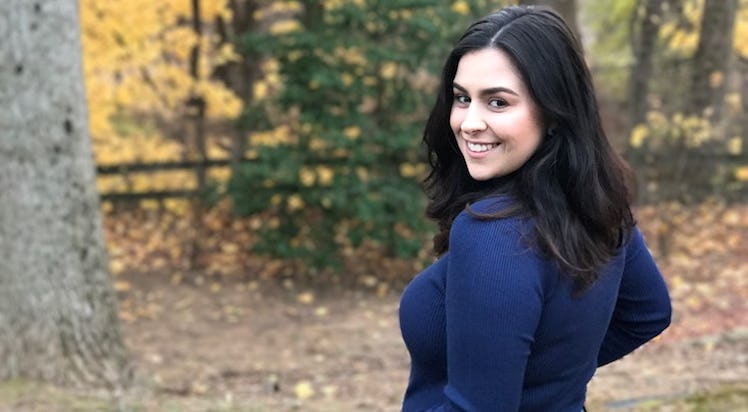
Changing My Gender Settings On Tinder Helped Me Come Out To My Friends & Family
In the summer of 2016, I was completely single for the first time in four years. I moved to a new city, and knew I wanted to meet new people. I was harboring my queerness, and at the time, only my ex-boyfriend knew of my sexuality. Most people in my life thought I was straight, but I knew I was attracted to people of any sex and gender – I knew I was queer. So when it came time to select my Tinder gender settings, I was pretty damn nervous about making my sexuality official. I didn't know what to expect when dating girls, non-binary, and genderqueer people – I only knew how to navigate dating a guy. And who would I talk about this new journey in exploring my identity? My ex-boyfriend? Yeah right. I didn't know what to do. So at first, I avoided it.
When I downloaded dating apps that summer, I only selected the "men" gender option. Because of the mutual friend feature on the app, I didn't want to inadvertently out myself when talking to someone. A girl on Tinder who'd have mutual friends with me could easily ask that friend how they know me, they'd say from school or South Florida or something, they'd in turn ask that girl how she knew me, and voilà. I'd be outed.
I bought and wore this hat before the 2016 election. I wasn't out yet, but it was a little way of being visible in the queer community.
I went out with some guys from Tinder and JSwipe (the Jewish version of Tinder), and then began to play with turning on the "men and women" gender setting, just to test the waters. At first, I didn't swipe right on any girls, avoiding any potential matches. I just wanted to see who was out there. I saw queer girls proudly proclaim their sexual identity on their profiles or mark their bios with cute pride flag emojis, while I still felt hidden, like I was peering into a community I didn't really feel a part of yet. Seeing their profiles made me want to meet them, but honestly, I felt stuck.
I wanted to go out with people of all genders, but I still hadn't told almost everyone in my life I was queer. So, I toggled the "men and women" option on and off while weighing my decision on whether to come out or not. I knew basically everyone in my life would be accepting, but coming out is a hugely vulnerable process, and I was scared to face being so open with people – I don't really like talking about deeply personal topics with a lot of people in general.
Another thing hindering me from actually matching with women on dating apps was I didn't even know what my sexuality identity was. I mean, I knew I was attracted to girls, guys, and anyone, really. But I didn't know how to label myself – queer, bisexual, and pansexual were all labels I considered – and couldn't really verbalize anything I was feeling. Mostly, I just felt confused, which stalled my coming out to people, which prevented me from dating whoever I wanted to date. It was just a great ride of confusion, TBH, and even since choosing a label – pansexual, which means I'm attracted to anyone, regardless of gender identity – I constantly am wondering if it's right or correct or accurate or whatever. Why can't I just be, seriously.
I slowly began telling people in my life I was queer (I later more identified with pansexual as a label) after the 2016 election because I was afraid of Vice President Mike Pence's attitude toward the gay community. I wanted to be a visible, out person, which entailed having to explain to family members what that actually meant. Once I was out, I became more confident flirting with girls in real life. That translated to leaving on the "men and women" gender setting, and eventually, going out with women.
Of course, I do occasionally need a break from dating apps – especially when being stalked on social media by people I've rejected on apps (this has happened from a variety of genders, FYI) – but usually come back after a couple of months feeling ready to swipe again. What can I say? I'm a hopeless romantic.
I've only been single since coming out (although I think Ruby Rose tweeting something I wrote means we are actually married), but having the ability to talk to other queer girls on dating apps such as Tinder has given me much more confidence in my identity than I was before it, and for that, well, thanks technology.